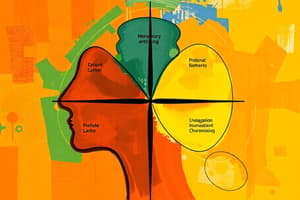Podcast
Questions and Answers
Conscientiousness reflects carelessness, unreliability, and disorganization.
Conscientiousness reflects carelessness, unreliability, and disorganization.
False (B)
Personality is fixed and cannot change over time.
Personality is fixed and cannot change over time.
False (B)
The five-factor model of personality includes Agreeability as one of the dimensions.
The five-factor model of personality includes Agreeability as one of the dimensions.
False (B)
Neuroticism measures emotional stability.
Neuroticism measures emotional stability.
Openness in the five-factor model includes traits like curiosity and intellectual interests.
Openness in the five-factor model includes traits like curiosity and intellectual interests.
Extraversion is characterized by introverted and reserved aspects.
Extraversion is characterized by introverted and reserved aspects.
Neuroticism has been linked to resilience against anxiety and depression.
Neuroticism has been linked to resilience against anxiety and depression.
The Big Five personality traits model identifies specific facets within each dimension.
The Big Five personality traits model identifies specific facets within each dimension.
Conscientiousness is associated with higher rates of substance abuse.
Conscientiousness is associated with higher rates of substance abuse.
Extroverted individuals are less likely to be seen as leaders in society.
Extroverted individuals are less likely to be seen as leaders in society.
Personality does not play a role in career choices according to the text.
Personality does not play a role in career choices according to the text.
Targeted interventions to promote positive personality traits are not mentioned as a potential future research area.
Targeted interventions to promote positive personality traits are not mentioned as a potential future research area.
Study Notes
Unlocking the Puzzle of Personality
Personality—a multifaceted, intriguing aspect of human life—has been a subject of fascination for centuries. As we delve into this realm, we'll explore the diverse dimensions of personality, its implications, and the ongoing efforts to understand it better.
What Is Personality?
Personality refers to a collection of stable characteristics that make each individual unique. These characteristics influence how people think, feel, and behave. Personality is not fixed; it can change and develop over time, but certain traits often remain consistent throughout a person's life.
Common Personality Theories
Numerous theories exist to explain personality. One widely recognized model is the five-factor model, which identifies five broad dimensions of personality:
- Openness: A measure of curiosity, imagination, and intellectual interests.
- Conscientiousness: A trait reflecting self-discipline, reliability, and organization.
- Extraversion: Characterized by social and energetic aspects, such as assertiveness and enjoyment of social interaction.
- Agreeableness: Includes traits such as compassion, cooperation, and trustworthiness.
- Neuroticism: Measures emotional stability, with high scorers experiencing more negative emotions like anxiety and depression.
Other popular theories include the Myers-Briggs Type Indicator (MBTI), which classifies people into 16 personality types, and the Big Five personality traits and factors model, which elaborates on the Big Five model by identifying specific facets within each dimension.
Personality and Mental Health
Personality traits are not symptoms of mental health disorders; however, some traits may relate to mental health. For instance, neuroticism has been linked to vulnerability to anxiety and depression, while conscientiousness has been associated with lower rates of substance abuse and better mental health outcomes.
Personality and Society
Personality is not only relevant to personal well-being but also shapes interactions and relationships within society. For example, extroverted individuals are more likely to be seen as leaders and contribute to social connectivity, while introverted individuals may prefer more solitary activities. Personality can also influence career choices, with conscientious individuals often excelling in roles that require organization and attention to detail.
The Future of Personality Research
Understanding personality is a complex and ongoing endeavor. Some emerging research areas include the use of technology to assess and predict personality traits, the role of genetics and neurobiology in shaping personality, and the potential for targeted interventions to promote positive personality traits.
In conclusion, personality is a fascinating topic that intersects with various aspects of human life, including mental health, relationships, and career choices. By exploring this realm, we can gain a deeper understanding of ourselves and the world around us. As we continue to unravel the mysteries of personality, we will undoubtedly learn more about the diverse, fascinating tapestry that is human nature.
Studying That Suits You
Use AI to generate personalized quizzes and flashcards to suit your learning preferences.
Description
Delve into the intricate world of personality as we uncover the dimensions, theories, and implications associated with this intriguing aspect of human behavior. Discover common personality models like the five-factor model and the Myers-Briggs Type Indicator, and explore the relationship between personality traits and mental health, society, and career choices.




